DIAL +258 MOZAM
The blood and soul of Mozambique – in Durban
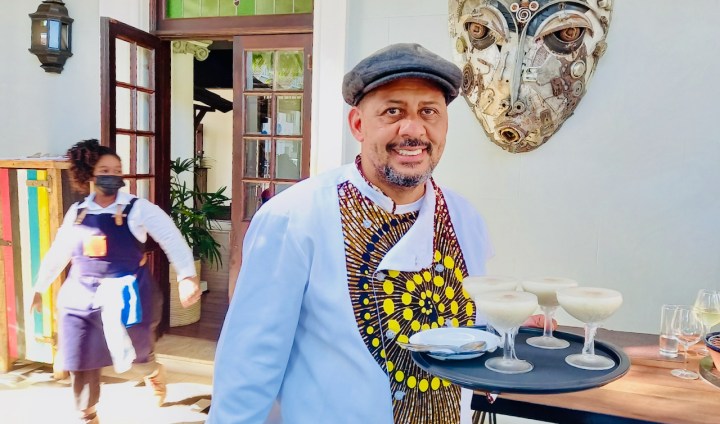
Roots food. The diverse flavours of Mozambique. An intermingling of pre-colonial and colonial influences in a marriage with family and regional traditions. We share João Pereira’s passionate cultural and culinary homage.
The author supports Food Forward SA, committed to a South Africa without hunger. Please support them here.
It is Sunday afternoon and four of us are aboard the train. Metaphorically speaking. We are, in fact, at a table, embarking on a gastronomic journey. It starts with a “compliments of the chef” item. What we are introduced to as “chutney”, served with toast. We are told it is a version of what, in Ghana, is called shito: a jammy blend of tomatoes and garlic and spices with dried fish and prawns.
Our chutney has made its way from West Africa to become a speciality item in northern Mozambique. “A marriage,” is how João Pereira explains it. One of many hook-ups, couplings and mergings he wants to share as we stop in at different stations, tasting food items and dishes with their regional, pre-colonial and colonial-era influences. Hence his train analogy.
“There is no way you can live your life without being influenced by experiences. Mozambique cuisine has fusion. Pre-colonial Arab and Indian influences. Colonial-era influences: Macau, Goa, Portugal… There has been some influence from all the former Portuguese colonies. A giving and taking. Cultural and culinary.”
His concept of “stations” is to have diners sit at a table and journey, as in experience and enjoy flavours and techniques from different parts of Mozambique.
“There are 11 provinces in Mozambique. (Ten plus the capital, Maputo, which has provincial status.) Each has a unique gastronomy. Each province has a speciality dish.”
If Pereira had a vision board, you would see on it a representation of a venue, which most likely will be in Cape Town, where each province will be separately showcased. The food. The music. The art. The culture. The history.
But now, his energy and passion is focused right here. Where we are. The stylish five-bar “museum, experience, restaurant” – he uses the words interchangeably – he and his life-and-business partner, Elsa Joaquim, have spent the last three years contemplating. And about seven months physically creating. And which is now in the process of softly opening, given that it will, for a while at least, be a testing-the-waters work in progress.
Because this is Durban and they are new to Durban. Although not new to restaurants. Pereira has five in Mozambique. Four in Beira, all hard-hit – twice – by cyclones. And one in Maputo, Black Salt, which on a less-grand scale is doing what he intends with +258 Mozam (+258 being the dialling code for Mozambique).
“At Black Salt I went to the roots, same as here. To our culture. And there, same as here, we do everything from scratch. Fresh coconut, sliced and pounded. Peanut milk, the peanuts roasted and pounded in-house. Then boiled. Used in some of the dishes.”
Softly opening also because, of course, there is Covid. With all that has come and may still come. And now load shedding. The first time I went to speak with Pereira, the power was permanently off.
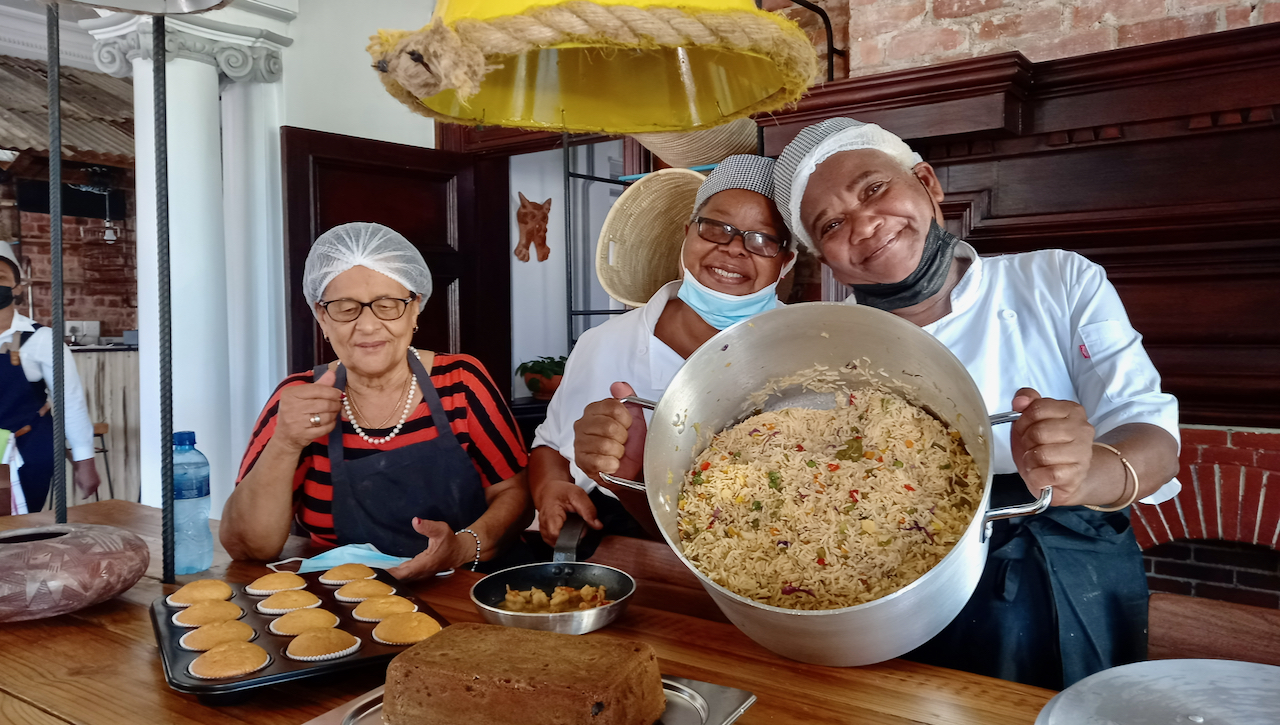
Moms Auguste Pereira and Albertina Joaquim take a break from kitchen duties, with aunt, Célia Cabral. (Photo: Wanda Hennig)
Before you think you’re getting yet another “colonial Portuguese” eatery, such as we in Durban have known and in the case of some, loved for years; or yet another branch of the well-represented chain that has helped us indelibly link Moz food with “Portuguese” peri-peri chicken and prawns and so on and so forth… Let me assure you, this is not what +258 Mozam is dishing up.
Pereira’s place is different. Completely different.
Think beef croquettes. The beef marinated for eight to 12 hours in garlic, bay leaves, ginger, oil. Then cooked, minced and ground. The soft inside of a loaf of pão (bread), fresh from the kitchen, soaked in milk and mixed in. The consistency: kind of dry but at the same time juicy. The flavour unique.
So when you go there, leave all your preconceptions and expectations at home.
On our train journey each item tasted remarkably different, from the peppery lamb curry, which probably should not be called a curry because immediately the mind wants to compare it with a familiar curry; to the smokey Macau-influenced seafood stew; to the Goan duck xacuti, which has 22 spices and is subtle with depth and actually, like nothing I’ve tasted.
We are with Pereira at historic “heritage” Hollis House on buzzy Florida Road. This is where he and Joaquim have created +258 Mozam. Where they have set up their coffee bar (downstairs), tapas bar and wine bar (upstairs), steak bar and fish bar (outside, next to the imposing black-and-white pizza oven).
Neo-Baroque, Edwardian (I read online) Hollis House, initially – way back – the home of the building contractor for the Durban City Hall (Jack Hollis), has in more recent years been the headquarters of the erstwhile Natal Teachers Society and subsequently, the grand but no-more restaurants, Society, then Czar. Then it stood empty for a time.
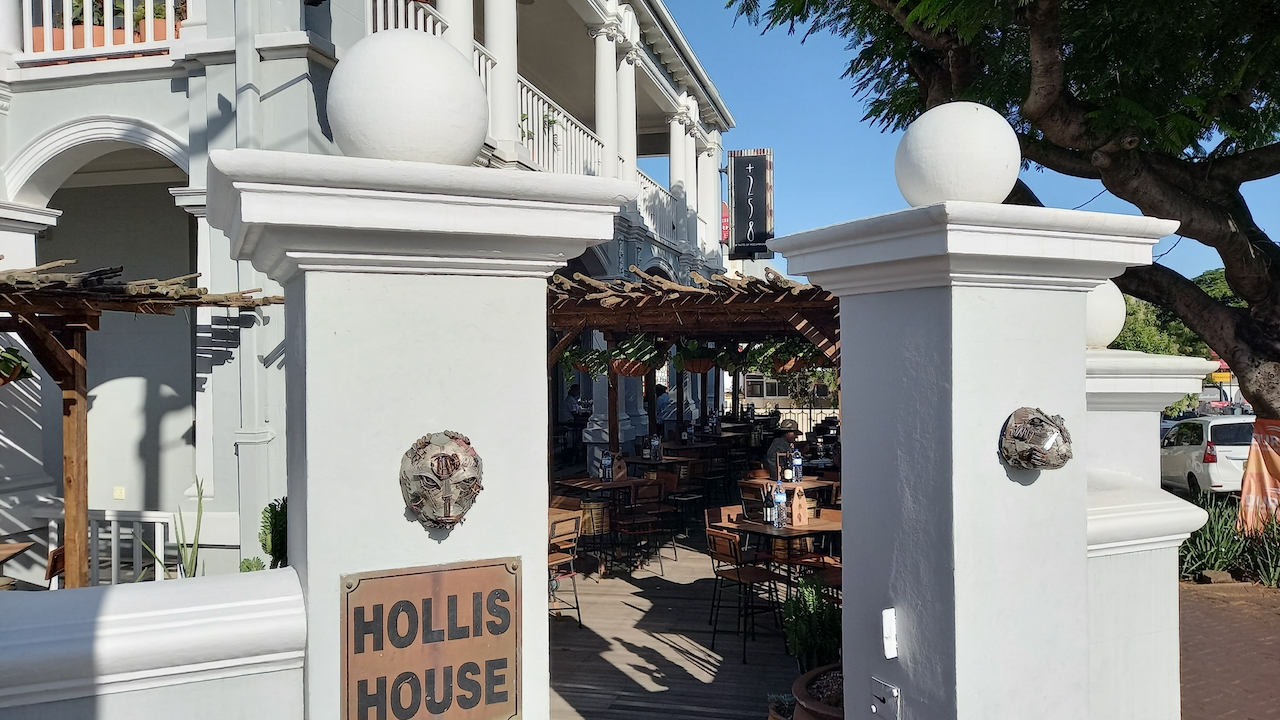
Historic Hollis House, the perfect setting for Pereira’s ‘museum’ to Mozambican gastronomy and culture. (Photo: Wanda Hennig)
The attention to detail at +258 is a sight to behold. Pereira came up with the “material” conceptual design.
“I wanted the blood and soul of Mozambique depicted,” he says.
The furniture, much of it forged from recycled wood and oh-so-creative in style, was custom made by Paul Chaplin in Ballito, who signs each piece. The huge, compelling, grandly framed black and white photographs, Mozambique images, were taken by a friend. “The idea is to sell them and donate part of the profits to social causes: education and health; water and sanitation.”
Pereira has put in a couple of hundred individually curated plants in pots. And art pieces that include several metal works reflecting Mozambique’s “transforming arms for peace” project. “Marginalised communities who make art with recycled weaponry – discarded guns, grenades – used by Renamo guerrillas during the country’s post-independence civil war.”
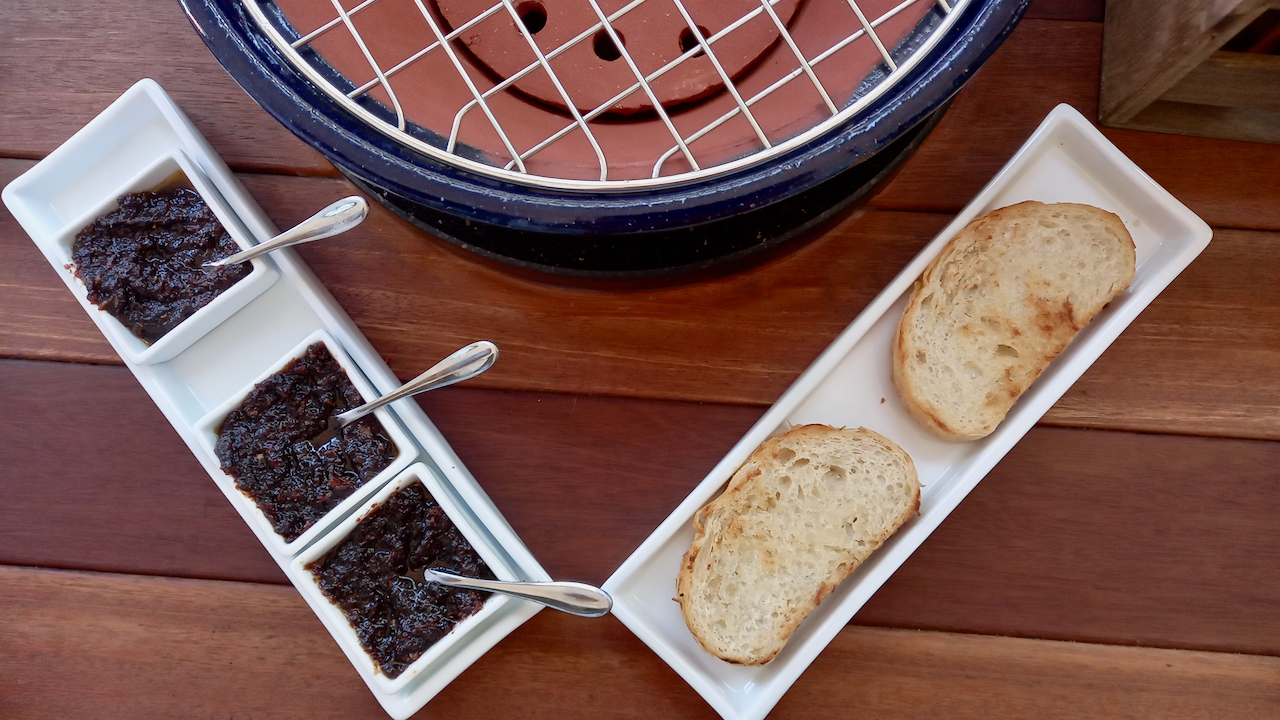
Chutney, a northern Mozambique speciality via Ghana. (Photo: Wanda Hennig)
Back to the food journey and the chutney. “To make this dish, if you’re living on the coast you will catch the seafood in the ocean. Fish and prawns. Dry them. Crush them. If you’re living inland, you will use a freshwater fish like tilapia. And river prawns.”
In our chutney, along with onions, garlic, bay leaves and ginger, there is a crunchiness from the dried seafood prepared in-house; an intense let-me-keep-eating flavour. One in our group asks for more toast. The other three know we’re having a chef’s tasting menu with lots to come so exercise restraint. We all tell Pereira later that we would happily return for more of this chutney, served with a glass of wine.
He in turn tells us that all the chef’s compliment dishes being served are also being tested. The more popular ones will go onto the tapas menu, for the tapas bar.
Which leads me to two key features of +258 that aren’t the norm for Durban.
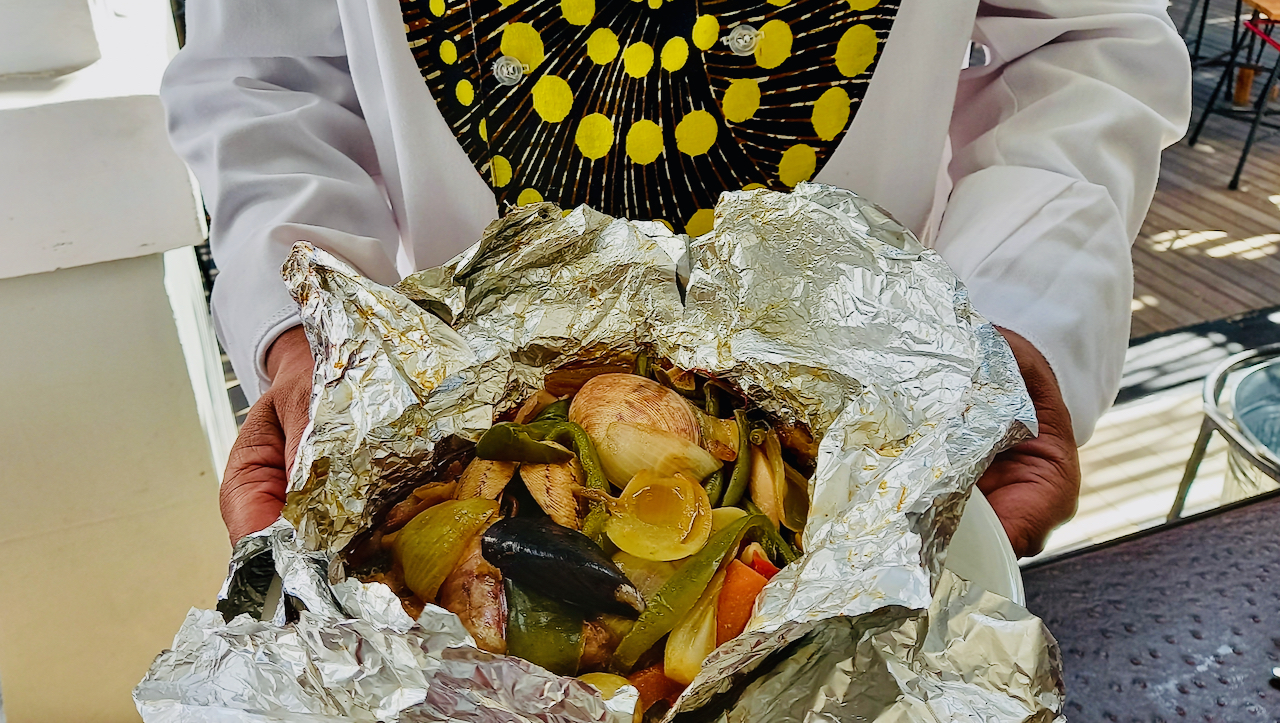
A seafood main to share, infused with flavours of Macau. (Photo: Wanda Hennig)
First, tasting menus are the focus.
Second, the menus are shared.
The tasting menus are set up for two or four people right now. Each menu includes beer or wine (the breakfast menu has other options), complimentary starters, four to eight mains, the desserts and coffee. This ties in with Pereira’s vision that each meal is a journey.
That the menus are for two or four (or multiples of) align with culture and tradition.
“Part of our culture, the way we live, is to share,” says Pereira.

Tilapia in the kitchen, awaiting prep. (Photo: Wanda Hennig)
“Food and sharing. This is the way to make people happy. If you cook with love and put flavour on the plate, people start smiling. They forget their problems. They start talking about the food. You’re feeding the soul.
“Cooking is also therapy. It helps bring people together. You create social cohesion.”
The menu journey and the sharing: both part of what Pereira sees as the “experience”.
“You’re not just coming here just to eat.”
What if I arrive as a single person?
He looks a little perplexed at my question.
“Join someone?” he offers. Not a bad idea. I think w-a-y back to the novelty of sharing tables with strangers at Wagamama, London, when it opened. And Italian family-style dining in California, with a shared table and platters passed around. And remember a Chinese restaurant in Malaysia, sharing platter after platter rotating on a lazy Susan.
And chefs’ tasting menus? Also a pretty common concept. If not commonplace.
Angola. Cape Verde. Guinea-Bissau. São Tomé and Príncipe. Portugal. Brazil. Goa. Through Mozambique’s Portuguese colonial history, all have to a lesser or greater extent influenced one another, muses Pereira.
Then there are family ties.
“My grandfather on my mom’s side was Italian. My grandfather on my dad’s side was from Goa. Both married Black women from central Mozambique.
“One of my first restaurants, in Beira, was an Italian restaurant. I brought Italian chefs from Italy to train the staff. Some people said when they ate there, they felt they were in Italy. Then a friend said, why are you spending all that time creating an Italian restaurant? We have so much in Mozambique.” Which led to Black Salt. And now +258.
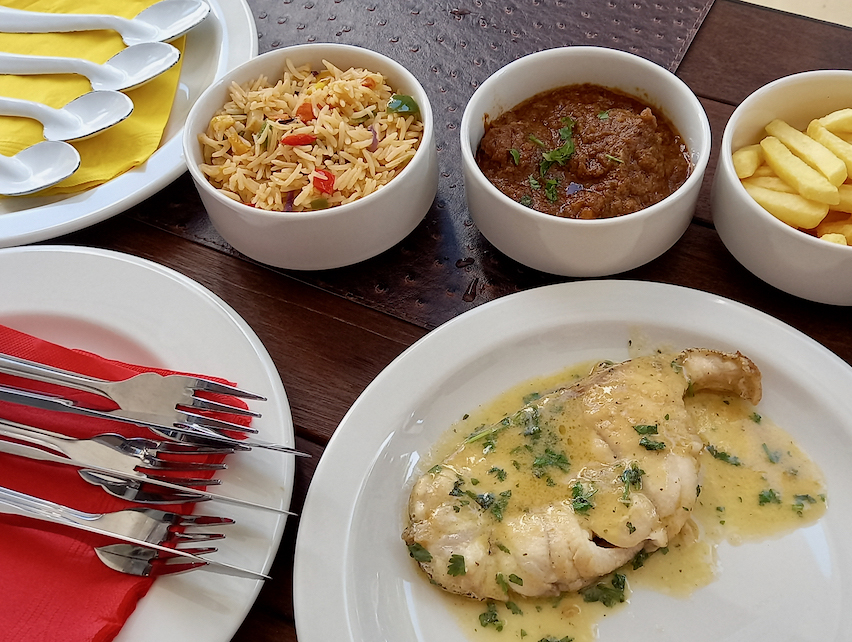
Grouper and a peppery lamb ‘stew’, two of eight mains our party of four shared. (Photo: Wanda Hennig)
“Beira, historically, had a big Chinese influence from Macau. My best friend in Beira you would think was Chinese. I learned from the mom of a Chinese girlfriend I had years ago in Beira how to prepare and appreciate grouper.” The fish, lightly grilled and drizzled with a sauce of butter, white wine and fish stock, made from scratch like all their stock, is on our shared menu.
For one of the two desserts he brings us Arab-influenced rice pudding made with rice flour, a delicacy in Cabo Delgado, way up north. When Vasco da Gama, exploring for Portugal, reached the coast of Mozambique in 1498, Arab trading settlements had existed along the coast and outlying islands for several centuries, I read online. The culinary legacy lives on.
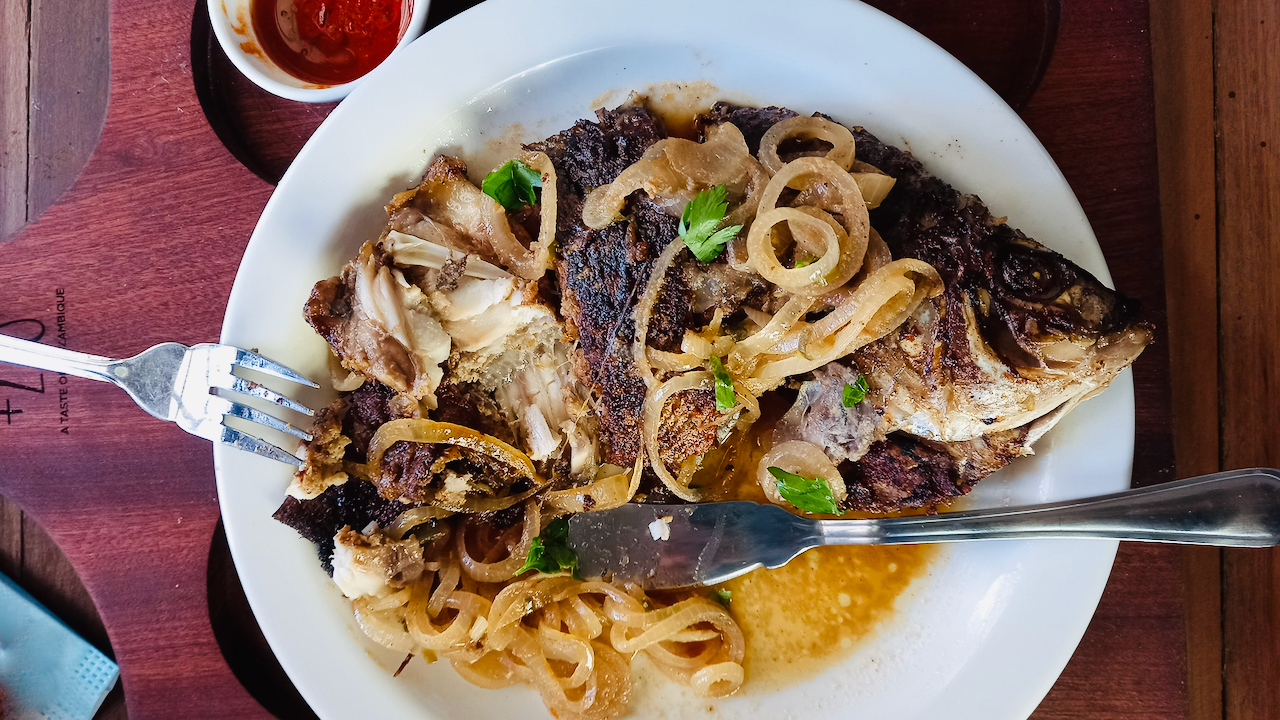
A whole tilapia, tasty and fall-off-the-bone succulent. (Photo: Wanda Hennig)
One of Pereira’s most common phrases when it comes to food is: “The way our mums…”
“I grew up in an environment with so much food. In our family, we all cook. We all love food. On Sundays everyone would cook, or bring what they’d cooked. We’d share. Enjoy. I can reproduce most of my mom’s recipes.”
Growing up and still now, at the table, with his brothers and sisters who are all good cooks “and me too”, the discussion was always recipes.
Not politics.
This will probably come as much of a surprise to readers as it was to me, tossed into the conversation pretty much as I am doing now.
It turns out, Pereira’s hobby is restaurants. As is Joaquim’s. In her day job, she is an accountant. In his, he is a professor. Politics is his field.
Pereira did his Masters at Wits. His PhD in Cape Town. He has been lecturing politics at the Eduardo Mondlane University, Mozambique’s oldest and largest, for 22 years.
He is also executive director of the MASC Foundation, a civil society organisation that drives change in poor communities and promotes good governance and development in Mozambique.
And next week he and Joaquim start a formal chef’s training course in Durban at CTIA (Chefs Training and Innovation).
“I don’t like being in a comfort zone,” he says. “Life is about trying different things. This is a good new journey for me. My mother sometimes calls me an octopus. So many tentacles. So many interests.”
She also says his mother has long made him conscious of values. “It’s not about how much money you have in your pocket but about how much you change and improve your life and what kind of legacy you want to leave.”
While at chef’s school, he tells me, “I will take the opportunity to write about the youth Islamic radicalisation in northern Mozambique.” It is something he has researched and written papers on already as a founder member and associate researcher with an initiative for social and economic studies.
Well, okay.
The moms of both Pereira and Joaquim are currently in the kitchen at +258 Mozam training staff by example and with gestures. Neither speaks English. But both them and an aunt, Célia Cabral, seem to be doing well and having a good time.
They will come and go, back and forward as needed, travelling between Durban and their respective homes in Mozambique.
Auguste Pereira is on the baking side. We ended lunch with a cupcake, described on the menu as “fruit cake”. It looked ordinary. But it was a taste blast. Port, imported from Porto, is used to marinate the fruit for two days.
Mrs Pereira started baking as a business in around 1985, her son says. Mozambique civil war time.
“We lost everything. My dad had worked for 25 years for a sugar company as a mechanic. Our house was destroyed. Our family hid out in the bush for three days.”
His parents and their eight children (six are still living) finally got to a rural village where they were fed by a humanitarian agency.
His dad fell into a depression. To take care of the family, his mom managed to get what was needed to start baking and selling her family-favourite coconut cake. Also matoritori, a type of sweet coconut biscuit widely baked and sold in rural areas and now at +258.
“She recruited others after a while. That’s how she fed us. Got us back on our feet.”
Her coconut cake is on the menu. “We bring in our coconuts from Mozambique. We slice them and pound them ourselves. We use a lot of coconut. Nothing from tins.”
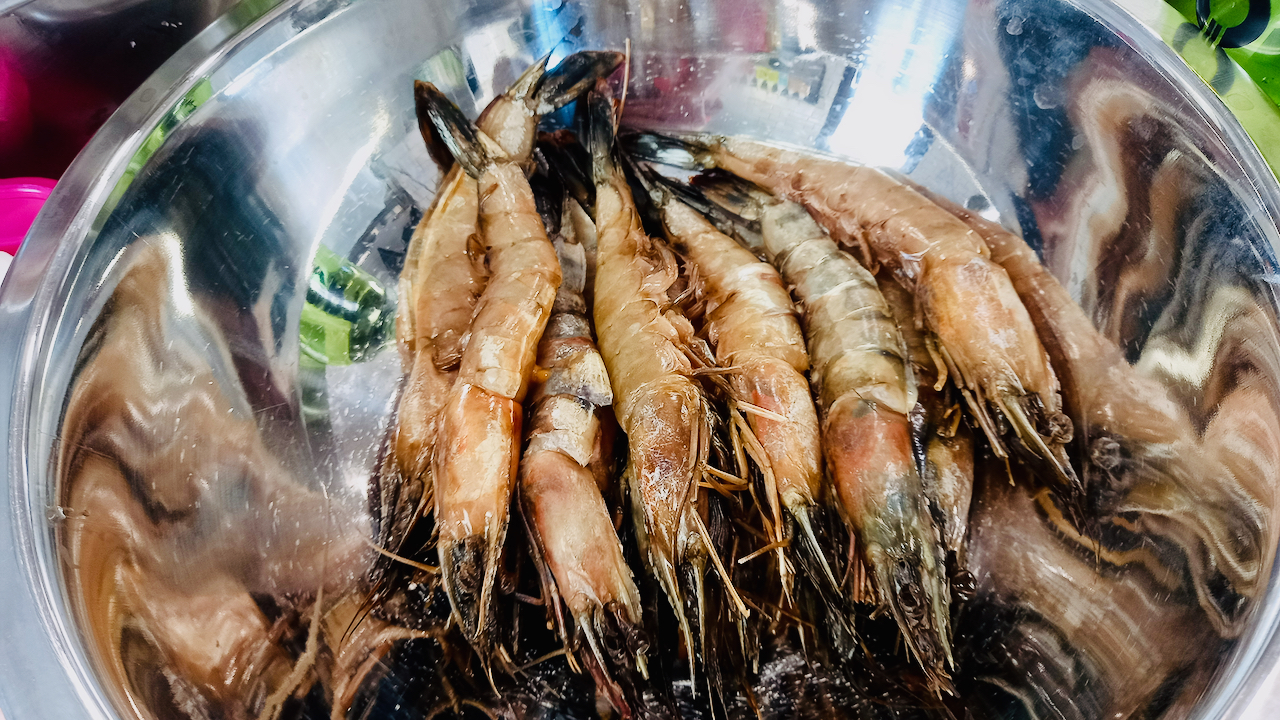
Mozambique prawns in the kitchen, ready to fire up. (Photo: Wanda Hennig)
Albertina Joaquim lives in Maputo. She has also been cooking all her life and runs a catering business. She brought her sister, Célia Cabral, to help.
When I barge into the kitchen with my camera and catch them in action, there’s no stopping them. The women and men who make up the kitchen crew, mainly South Africans, are keeping up with the action. I don’t believe I’ve ever seen such a clean, energetic kitchen.
Food, as Professor Pereira says, is the great unifier. “You arrive in a bad mood. Preoccupied. You sit and start eating well. You start to smile. You go home happy.”
He hopes diners will go home both happy and with a more in-depth appreciation of the vastness and depth of Mozambique’s culinary culture, traditions and flavours. The simple sophistication of the food, given its international, historic and diverse influences.
Let’s hope +258 Mozam succeeds and we all go home happy. DM/TGIFood
Visit +258 on Facebook 258Mozam Follow +258 on Instagram 258mozam





 Become an Insider
Become an Insider
Comments - Please login in order to comment.